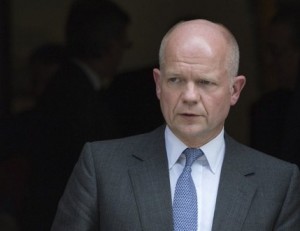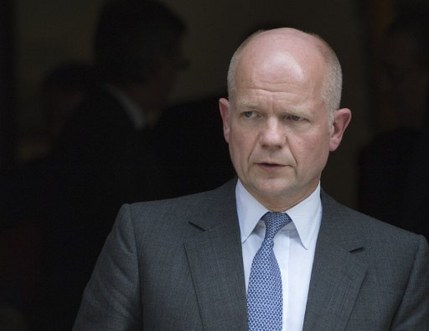
(AFP Photo)
British Foreign Secretary William Hague launched the British Foreign and Commonwealth Office’s (FCO) 2012 Annual Human Rights and Democracy Report. The report, which focused on human rights and democracy in the world, recognised progress in Egypt but points out that “issues of concern remain”.
Speaking in London at the launch of the report on Monday, Hague said: “The people of the Middle East are showing incredible courage as they battle for democracy and individual liberty.” On this point he highlighted that the “determination for change has brought the first ever truly democratic presidential elections in Egypt”.
Hague also mentioned “the deterioration in law and order in Egypt, as well as the economic problems that all post-revolution countries are facing”. He added that these issues “remind us that it takes time to build the foundations of strong institutions, responsible and accountable government, a free press, and equal rights for men and women”.
The report itself used Egypt as a post-revolution case study, stating “there have been a number of improvements in the human rights situation in Egypt”. In this regard the report mentioned the transfer of power from the Supreme Council of the Armed Forces (SCAF) to President Mohamed Morsi. It also pointed out “there is now greater space for public debate”.
The case-study then changed its tone, saying: “However, issues of concern remain.” It pointed out that at the forefront of these issues are “women’s rights, freedom of religion and freedom of expression”. The report stated that women “have seen little improvement in their rights” and the FCO was concerned about the rise in reports of sexual assaults. The British ministry was also concerned about the “continued sectarian violence” and pointed out that Britain has “supported a project to create a partnership between mainstream Muslim and Christian groups to train mixed teams in conflict resolution and mediation skills”.
Further concern was expressed over Egypt’s constitution that was passed by referendum in December 2012. The FCO report said it “lacks clarity on certain human rights elements”, highlighting that “while it gives Muslims, Christians and Jews the right to practise their religion, it does not give the same freedom to other religions and minority sects”.
“We are concerned about limits on freedom of expression in Egypt,” said the report, “including the increase in prosecutions of bloggers and activists, closing of satellite television stations, and lack of clarity on the definition of blasphemy, which is illegal under the new constitution.” In addition to this the FCO was also worried about “ongoing harassment and intimidation of trade union officials,” and an article in the constitution, “which prohibits more than one trade union per profession”. The report added: “Trade unions have an important role to play in developing a healthy democracy.”
The Human Rights and Democracy Report is an annual report that details the FCO’s efforts to promote human rights around the world.


